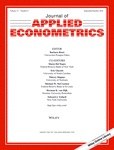
Koning, P., Ridder, G. and \Van Den Berg\, \GerardJ.\ (1995). Structural and frictional unemployment in an equilibrium search model with heterogeneous agents Journal of Applied Econometrics, 10(1 S):S133--S151.
-
Affiliated author
-
Publication year1995
-
JournalJournal of Applied Econometrics
We specify and estimate an equilibrium search model with between‐market heterogeneity in the productivity levels. The model allows for two types of unemployment: unemployment due to search frictions and unemployment due to wage floors. Wage floors may exist, because of large unemployment benefits or a binding (mandatory) minimum wage. Using data on labour market histories for a sample of Dutch workers, we decompose the total unemployment rate in a structural and frictional unemployment rate. We also discuss the effect of changes in the minimum wage.